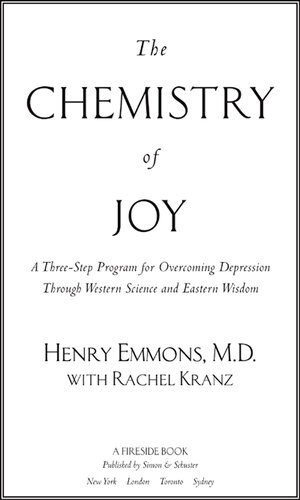
The Chemistry of Joy
A Three-Step Program for Overcoming Depression Through Western Science and Eastern Wisdom
کتاب های مرتبط
- اطلاعات
- نقد و بررسی
- دیدگاه کاربران
نقد و بررسی

November 28, 2005
Psychiatrist Emmons offers hope to sufferers of mild to severe depression in this well-articulated approach to integrating therapeutic techniques from East and West. Identifying three main forms of depression—anxious, agitated and sluggish—Emmons pinpoints three intellectual/physical/spiritual " types" these varieties of depression correspond with, and explains how the types mirror ones described in India's ayurvedic medicine and in Buddhist psychology. A student of Jon Kabat-Zinn (Wherever You Go, There You Are
) and Deepak Chopra (Perfect Health
), Emmons draws on their work in the fields of mindfulness meditation and mind-body medicine, respectively, to help readers find the most effective combination of diet, supplements, exercise and stress-relieving techniques. He provides personal stories to illustrate how brain chemistry and medication can alter behavior and mood and discusses how readers can evaluate their own need for medication. In later chapters, Emmons offers strategies for accessing inner strength and wisdom, once brain and body chemistry are balanced. While much has been written on complementary care for most conditions, readers battling depression will likely find Emmons's vision of healing informative and persuasive; others will find many practical ways to achieve a healthy lifestyle.

Starred review from November 15, 2005
This excellent self-help manual by psychiatrist Emmons (Allina Medical Clinic, Northfield, MN) combines traditional Western approaches to depression with alternative therapies. He finds that Western neurochemists, Ayurvedic medicine, and Buddhist psychology all posit the existence of three types of depressive states, to which he refers as anxious depression, agitated depression, and sluggish depression. To treat each type, he prescribes diet and exercise regimens and nutritional supplements, as well as spiritual and psychological exercises. Emmons likens the treatment that most people receive for depression to a doctor prescribing a cholesterol-reducing drug to a heart patient without counseling the person to quit smoking, make dietary changes, and get more exercise. He advocates cautious use of antidepressants in certain cases and includes several suitably highlighted warnings for those who already take such medications. Studies are generally cited to support the advocated dietary and lifestyle recommendations. Self-help titles for mild depression are perennially popular, and this one is both useful and responsible. Highly recommended for all public and most academic libraries." -Mary Ann Hughes, Neill P.L., Pullman, WA"
Copyright 2005 Library Journal, LLC Used with permission.

























دیدگاه کاربران